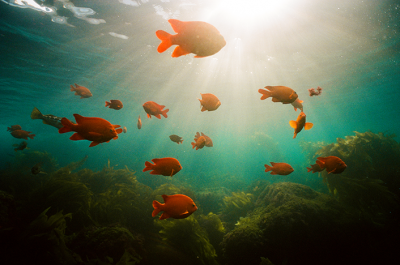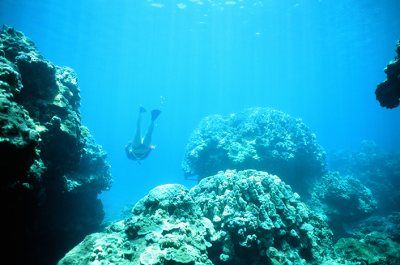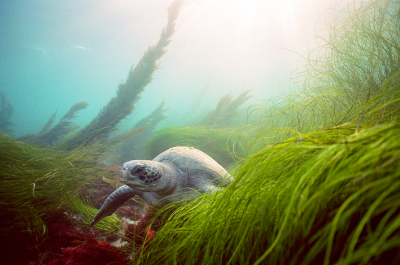Ryan Kich grew up in the San Francisco Bay Area and later attended Diablo Valley College where he studied jazz performance, before obtaining his Associate’s degrees in biology and physical science. He then transferred to Scripps Institution of Oceanography at the University of California San Diego to continue his path in science and finished his undergraduate education in marine biology. Kich is now a second-year master's student in the contiguous bachelor’s/master’s degree program (BS/MS) at Scripps, researching microbial ecology in the lab of marine biologist Eric Allen.
explorations now: Why did you choose to attend Scripps?
Ryan Kich: As a community college student, I knew that I would only have two years after I transferred, and I wanted to get as much undergraduate research experience as possible. Scripps Oceanography at UC San Diego quickly became my top choice after learning about the number of labs and diversity of research. I also knew that undergraduate research experience could lead to the BS/MS program, and I really wanted to get a taste of graduate school before committing to a PhD program.
en: What are you researching at Scripps?
RK: At the Allen lab, we study microbial ecology, or how microbes interact with each other and their environments. My current research is focused on the fish gill microbiome, where my project goal is to describe the nature of a symbiosis between Pacific Chub Mackerel gills and a novel species of bacteria that I isolated. To assess this, I am using a combination of microbiology and bioinformatic techniques. The fish microbiome is a super exciting area of research. Each fish has its own complex community of potentially thousands of different microorganisms in each body site (gills, mucosal skin, gut, etc.), where some of those constituents may be good, bad, or neutral to fish health. As of today, there are about 34,000 species of fish described—which means there is a lot to learn about fish microbiomes. I am excited to see where the field will go, what we can learn from it, and how we can apply it.

en: How did you become interested in science and your field of study?
RK: I have been interested in science for as long as I can remember. From an early age, my parents would take my sister and I to the tide pools, where it was easy to wonder about the lives of diverse critters. I credit this experience for starting my lifelong interest in the ocean. When I was a physics student in high school, I had a teacher who really believed in me and my path in science, despite having poor grades. This inspired me to work hard as a community college student and to pursue a career in science and education. In my first quarter as a Scripps undergraduate, I met a then-graduate student Jake Minich, who introduced me to marine microbial ecology. I subsequently learned about how knowledge of fish microbiomes could impact real-world issues such as food security and overharvesting in fisheries. After I learned about the magic of microbial diversity through Scripps marine biologist Doug Bartlett’s class on extremophilic bacteria, I knew this was a field I could spend a lifetime wondering about.
en: What’s life like as a Scripps student? Describe a typical day.
RK: I always start with my ritual of waking up and making a breakfast burrito and coffee. Every day, I park my car down by the beach and make my trek up to Scripps, while listening to tunes or taking pictures. After that, every day is different. I will usually have some combination of working in the wet lab, staying up to date on scientific literature, working as a teaching assistant, attending scientific seminars or meetings, and gathering sample collections on the pier. When time permits, I will usually spend the late afternoon freediving or rock climbing. The variability in my day is something I highly value about being a student scientist. I always look forward to the next step in my project.

en: What’s the most exciting thing about your work (in the field or in the lab)?
RK: As much as I love field work, I am most excited to be working with genomic data. Genomic data can tell us a lot about a microorganism or a microbiome, which is a community of microorganisms. We start by purifying DNA from an environmental sample, such as a gill swab, or from a bacteria culture. When the DNA gets sequenced, we end up with thousands of lines of nucleotides: A, T, G, and C. We use computers to organize those lines of sequences into full chromosomes (the things that humans have 24 of). We can then use programs which use huge public databases of genomic data to scan our chromosome for any known or hypothetical genes. These genes give us a great idea for what a microbe/microbiome is capable of doing in its environment! It takes a lot of diligence to prepare samples for sequencing. From sample acquisition to nucleotide extraction, a lot can go wrong if you’re not careful. Getting back genomic data is (usually) a huge relief and an affirmation that you’ve done good work. It feels like magic being able to turn a list of nucleotides (A, T, G, and C’s) into information that can not only allude to an organism’s identity, metabolic potential, and activity, but also to community structure and function. Right now is a special time to work with genomic data because in my lifetime, it has become millions of times cheaper to generate sequence data. This has really opened the door for scientists to start asking more questions with larger sample sizes about the roles that microbes play in their environments.
en: Are there any role models or mentors who have helped you along the way?
RK: It certainly takes a village. Besides my very supportive family and partner, my lab mates have been imperative to my development as a student scientist. I must credit Jake Minich for introducing me to the field of microbial ecology and showing me how to find my own voice as a scientist. My advisor, marine biologist Eric Allen, inspires me with his incredible expertise, enthusiasm, and optimism, while giving me the space to explore questions. I am also incredibly grateful for a PhD student in our lab, Entesar Alrubaiaan, who has been important to my success in working with molecular and culturing techniques, while being a supportive mentor through the tough times this last year. There are so many other friends, colleagues, and educators who have helped me along the way.
en: What are some of the challenges you face as a student?
RK: There is definitely a certain set of challenges with the transition from undergrad to graduate school. In my experience, the biggest challenge is that there is no guidebook to navigating your project. Problems happen at every step of the way, and it is ultimately up to you to find the motivation and solutions to move forward. Trying to start and finish a graduate program during the pandemic has certainly compounded these challenges, as communication, mental health, motivation, and productivity were at an all-time low. However, this situation forced me both to learn fast, and to appreciate the world around me.

en: What are your plans post-Scripps?
RK: Post-Scripps, I plan on contributing to science, education, and media surrounding the ocean. However, I am not yet sure what form that will take. The only thing I am certain of, is that there is a lot more I wish to learn. After paying off some student loans, I am planning on completing my PhD, so I can become a better scientist and educator. One day, I would like to see myself as a teaching professor. However, I also feel very passionate about the power of photo and video media, and how it can inform people about ocean organisms and phenomena while inspiring them to advocate for the ocean. As a hobbyist underwater photographer, I often dream about the idea of becoming a freelance photographer.
You can find Kich on Instagram @kich.negatives and on Twitter @KichRyan.